Nrnp6566 week 7 - Study guides, Class notes & Summaries
Looking for the best study guides, study notes and summaries about Nrnp6566 week 7? On this page you'll find 96 study documents about Nrnp6566 week 7.
Page 4 out of 96 results
Sort by
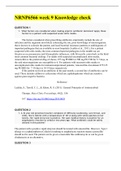
-
NRNP6566 week 9 Knowledge check
- Exam (elaborations) • 6 pages • 2023
-
- $12.44
- + learn more
NRNP6566 week 9 Knowledge check The factors considered when prescribing antibiotics empirically include the site of infection and the organism most likely colonizing the site, prior knowledge of microorganism that is known to colonize the patient, and local bacterial resistance patterns or antibiograms of important pathogens that are available in most hospitals (Leekha et al., 2011). For a patient suspected with otitis media, the most common bacterial pathogens in the middle ear are Streptoco...
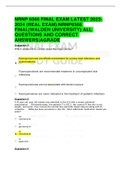
-
NRNP 6566 FINAL EXAM LATEST 2023-2024 (REAL EXAM)/NRNP6566 FINAL(WALDEN UNIVERSITY) ALL QUESTIONS AND CORRECT ANSWERS|AGRADE
- Exam (elaborations) • 24 pages • 2023
- Available in package deal
-
- $28.49
- + learn more
NRNP 6566 FINAL EXAM LATEST 2023-2024 (REAL EXAM)/NRNP6566 FINAL(WALDEN UNIVERSITY) ALL QUESTIONS AND CORRECT ANSWERS|AGRADE Question 1 Which statement is correct about fluoroquinolones? fluoroquinolones are effective treatment for urinary tract infections and pyelonephritis Fluoroquinolones are recommended treatment in uncomplicated skin infections fluoroquinolones are not associated with tendon rupture fluoroquinolones are never indicated in the treatment of pediatric infection...
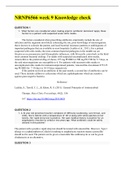
-
NRNP6566 week 9 Knowledge check
- Exam (elaborations) • 6 pages • 2023
-
- $10.49
- + learn more
NRNP6566 week 9 Knowledge check The factors considered when prescribing antibiotics empirically include the site of infection and the organism most likely colonizing the site, prior knowledge of microorganism that is known to colonize the patient, and local bacterial resistance patterns or antibiograms of important pathogens that are available in most hospitals (Leekha et al., 2011). For a patient suspected with otitis media, the most common bacterial pathogens in the middle ear are Streptoco...
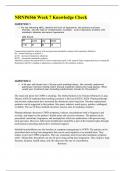
-
NRNP6566 Week 7 Knowledge Check
- Exam (elaborations) • 7 pages • 2024
-
- $10.59
- + learn more
NRNP6566 Week 7 Knowledge Check pH pCO2 pO2 HCO3 7.36 30 80 15 Compensated metabolic acidosis with no hypoxemia (metabolic acidosis with respiratory alkalosis) Ph – normal (leaning on acidosis ) pCO2 – decreased (respiratory alkalosis) HCO3 – decreased (rmetabolic acidosis) Metabolic acidosis (decreased HCO3) with no hypoxemia (pO2 is 80, normal) Fully compensated due to normal pH. Respiratory (pCO2) is leading to alkalemia to compensate for the metabolic acidosis. ...
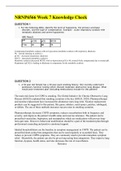
-
NRNP6566 week 9 Knowledge check
- Exam (elaborations) • 7 pages • 2022
-
- $11.48
- + learn more
NRNP6566 week 9 Knowledge check The factors considered when prescribing antibiotics empirically include the site of infection and the organism most likely colonizing the site, prior knowledge of microorganism that is known to colonize the patient, and local bacterial resistance patterns or antibiograms of important pathogens that are available in most hospitals (Leekha et al., 2011). For a patient suspected with otitis media, the most common bacterial pathogens in the middle ear are Streptoco...

-
NRNP6566 Week 7 Knowledge Check
- Exam (elaborations) • 7 pages • 2024
-
- $11.49
- + learn more
NRNP6566 Week 7 Knowledge Check pH pCO2 pO2 HCO3 7.36 30 80 15 Compensated metabolic acidosis with no hypoxemia (metabolic acidosis with respiratory alkalosis) Ph – normal (leaning on acidosis ) pCO2 – decreased (respiratory alkalosis) HCO3 – decreased (rmetabolic acidosis) Metabolic acidosis (decreased HCO3) with no hypoxemia (pO2 is 80, normal) Fully compensated due to normal pH. Respiratory (pCO2) is leading to alkalemia to compensate for the metabolic acidosis. ...
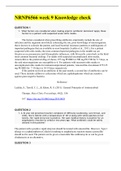
-
NRNP6566 week 9 Knowledge check
- Exam (elaborations) • 6 pages • 2022
-
- $12.48
- + learn more
NRNP6566 week 9 Knowledge check The factors considered when prescribing antibiotics empirically include the site of infection and the organism most likely colonizing the site, prior knowledge of microorganism that is known to colonize the patient, and local bacterial resistance patterns or antibiograms of important pathogens that are available in most hospitals (Leekha et al., 2011). For a patient suspected with otitis media, the most common bacterial pathogens in the middle ear are Streptoco...
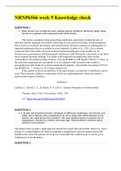
-
NRNP6566 week 9 Knowledge check
- Exam (elaborations) • 6 pages • 2023
-
- $10.99
- + learn more
NRNP6566 week 9 Knowledge check The factors considered when prescribing antibiotics empirically include the site of infection and the organism most likely colonizing the site, prior knowledge of microorganism that is known to colonize the patient, and local bacterial resistance patterns or antibiograms of important pathogens that are available in most hospitals (Leekha et al., 2011). For a patient suspected with otitis media, the most common bacterial pathogens in the middle ear are Streptoco...
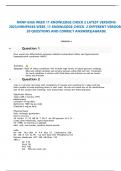
-
NRNP 6566 WEEK 11 KNOWLEDGE CHECK 2 LATEST VERSIONS 2023/NRNP6566 WEEK_11 KNOWLEDGE CHECK 2 DIFFERENT VERSIONS 20 QUESTIONS AND CORRECT ANSWERS|AGRADE
- Exam (elaborations) • 15 pages • 2024
-
- $10.49
- + learn more
Question 1 • Question 2 NRNP 6566 WEEK 11 KNOWLEDGE CHECK 2 LATEST VERSIONS 2023/NRNP6566 WEEK_11 KNOWLEDGE CHECK 2 DIFFERENT VERSIONS 20 QUESTIONS AND CORRECT ANSWERS|AGRADE VERSION A How would you differentiate between diabetic ketoacidosis (DKA) and hyperosmolar hyperglycemic syndrome (HHS)? Correct Answer: Both of these conditions will include high levels of blood glucose readings. DKA will exhibit acidosis and urinary ketones while HHS will not. Treatment for each condition is...
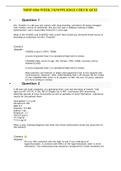
-
NRNP 6566 WEEK 3- 9 KNOWLEDGE CHECK QUIZ BUNDLE 100% VERIFIED
- Package deal • 7 items • 2021
-
- $22.99
- 4x sold
- + learn more
1 Exam (elaborations) NRNP 6566 WEEK 3 KNOWLEDGE CHECK QUIZ 2 Exam (elaborations) NRNP 6566 Week 4 Knowledge Check 3 Exam (elaborations) NRNP 6566 Week 5 Knowledge Check 4 Exam (elaborations) NRNP 6566 Week 6 Knowledge Check 5 Exam (elaborations) NRNP6566 Week 7 Knowledge Check 6 Exam (elaborations) NRNP6566 KNOWLEDGE CHECK WEEK 8 7 Exam (ela

How much did you already spend on Stuvia? Imagine there are plenty more of you out there paying for study notes, but this time YOU are the seller. Ka-ching! Discover all about earning on Stuvia


